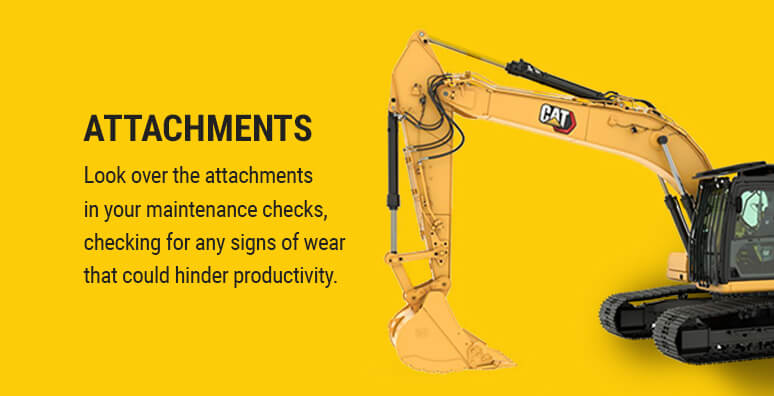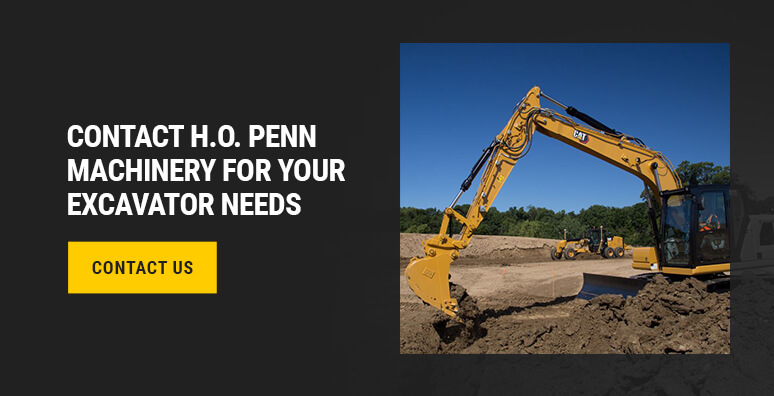
Excavators can fulfill a variety of jobs on your worksite, making your business more efficient and productive. At H.O. Penn, we have a variety of CAT® excavators to keep your worksite running smoothly. For it to stay working as well as you need it to, it is important that you implement good maintenance practices. Here are some of the best things you can do to keep your excavator in great shape.
Excavator Maintenance Tips
When performing excavator maintenance, it is important to look into every part of the machine. Here are some of the things you should work on during maintenance:
1. Tracks
Look over the excavator tracks and ensure they are set at the correct tension. They could wear more quickly if they are too tight or too loose. The chains and sprockets could also experience wear and tear if the tracks are not maintained properly.
When examining the tracks, look for any cuts, tears or areas where the steel imbeds are exposed. These exposed areas can cause moisture and contamination to get into the track, causing damage.
2. Filters
Excavators have multiple filters to keep the engine, air, fuel and hydraulic systems running smoothly. If your excavator is going to perform well over a long period of time, it is essential you maintain these filters properly. Clogged or dirty filters can compromise sensitive parts of the excavator and impact overall performance.
Your excavator should have an indicator that lets you know when the filters need attention. It is important not to mess with the machine’s filters before this happens and address the issue as quickly as possible when the indicator appears.
3. Fuel
Your excavator requires a specific type of fuel to perform at its best, specifically No. 1 or No. 2 grade diesel fuel. If you use your excavator in cold weather, it is a good idea to use a specially formulated blend of fuel to prevent gelling due to the low temperatures. The goal is to limit the amount of exhaust emission levels.
4. Cooling System
Your excavator needs adequate airflow and an appropriate coolant level to run smoothly and efficiently. If you work in an excessively hot climate, this is extra important to ensure your machine doesn’t overwork just to keep cool. Check the coolant hoses in your system for leaks and clean the oil cooler, condenser and radiator by applying low-pressure water or air.

5. Attachments
Your excavator likely has work tools and attachments that allow it to do jobs specific to your business. This could include shanks, teeth, cutting edges and hydraulic hoses. If these attachments are used for rough jobs, they could develop wear that makes them dangerous to use. Look over the attachments in your maintenance checks, checking for any signs of wear that could hinder productivity.
6. Electrical System
Excavators use batteries and fuses in their electrical systems. The fuses protect the system should there be an electrical overload. When performing a maintenance check, always confirm the fuses work and replace any that have failed. Be sure to replace the old ones with fuses of the same type and amperage rating.
You should also check your battery cables to ensure they are tight and clean. Look for corrosion on the battery terminal and cable ends. When examining the battery, take any preventive action you can to help limit the maintenance issues you might encounter.
7. Water Separator
The water separator in your excavator contains the water that builds up from condensation when your excavator sits outside overnight. You must drain the water every day, or it will cause corrosion on your excavator when it becomes steam.
8. Undercarriage
Excavator undercarriage maintenance is perhaps the most essential piece of maintenance for your excavator. Here are some tips to ensure your excavator undercarriage is properly maintained:
- Keep it clean: Make examining the excavator undercarriage and cleaning out any dirt and debris collected during the day part of your regular daily maintenance routine. This will help prevent buildup that could accelerate wear and tear, especially in the cold. Debris can also cause your excavator to lose fuel economy since it adds weight to the machine. You can use a shovel, pressure washer or other tools to eliminate dirt.
- Do a thorough inspection: Though you should check the undercarriage for dirt every day, you should also make sure there are no missing or damaged components or uneven or excessive wear. This is especially true if you use the excavator in harsh conditions where these situations are more likely to occur. In that case, perform inspections even more frequently.
- Track tension: Ensuring the tracks are held at the right tension will keep the entire undercarriage in better condition and prevent it from wearing too quickly. You need to find the right balance between tracks that are too tight and too loose.
- Rubber tracks: If you use your excavator on sensitive surfaces or use a mini excavator, rubber tracks are available for mini excavator undercarriages. These tracks give your excavator good flotation and help it travel across soft ground conditions.
- Proper digging procedures: For your excavator undercarriage to stay in good condition, you should adhere to the operating procedures outlined in your manual that tell you what you should and should not do when digging.
Best Excavator Practices
Follow these best practices when operating your excavator to make the excavator maintenance process easier:
- Wide turns: Narrow turns can cause your excavator to wear quickly and lead to de-tracking. Create a safe navigation plan at each worksite that minimizes unnecessary turns.
- Avoid slopes: Excavators do not do well when they work on slopes for a long period of time. Sometimes hills are inevitable, in which case you should make sure the drive motor is facing the back of the machine.
- Avoid harsh environments: If you can, keep your excavator away from harsh working environments such as rough concrete, asphalt and other abrasive materials that could cause wear and damage to the tracks.
- Limit unnecessary spinning: Make limited wide and aggressive turns when operating your excavator. This can cause tracks to wear, decreasing productivity and efficiency.
- Shoe width and grousers: Use the weight of the machine and the intended use to choose the proper shoe width for your excavator. Determine the appropriate number of grousers for each shoe based on your intended use for the excavator.
Contact H.O. Penn Machinery for Your Excavator Needs
H.O. Penn has the CAT excavators you need to finish the job ahead of you. Contact us today to find out more about how we can help you get the right excavator for you and your worksite.

